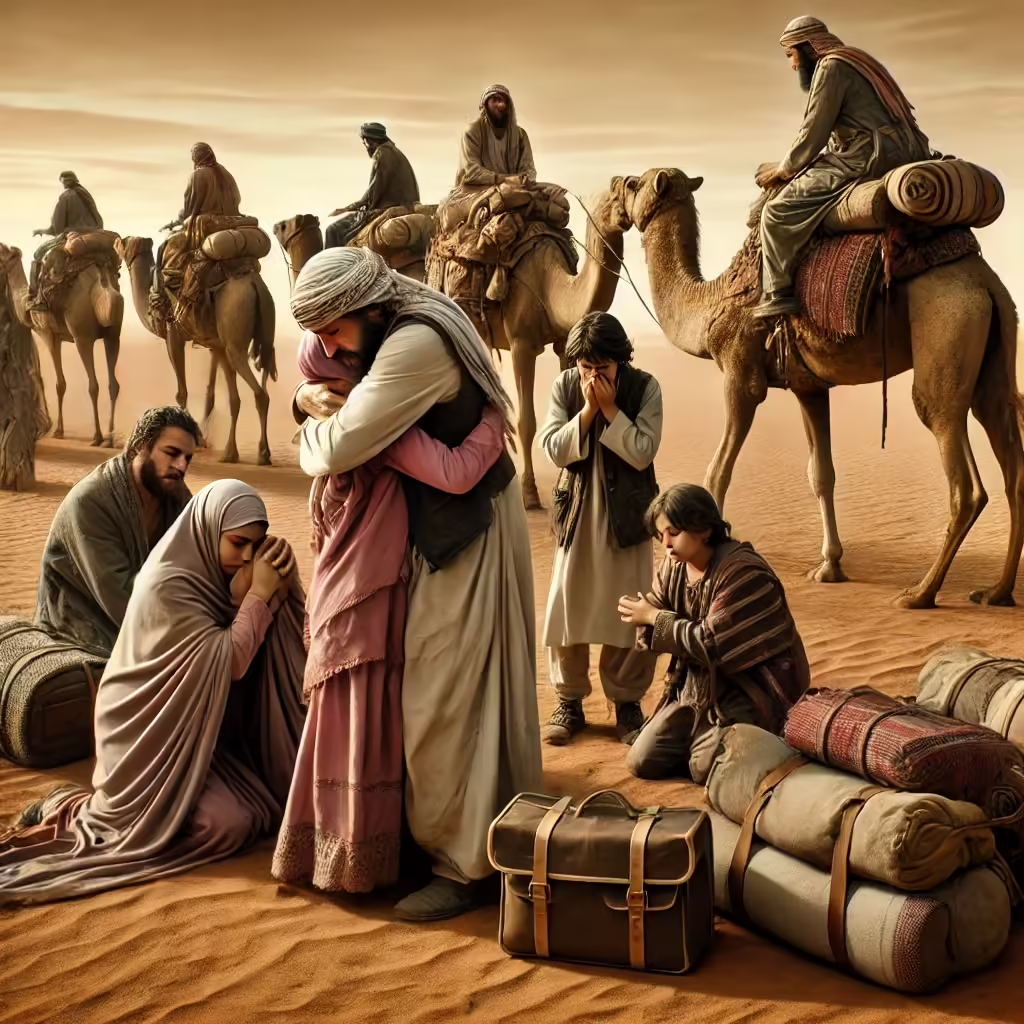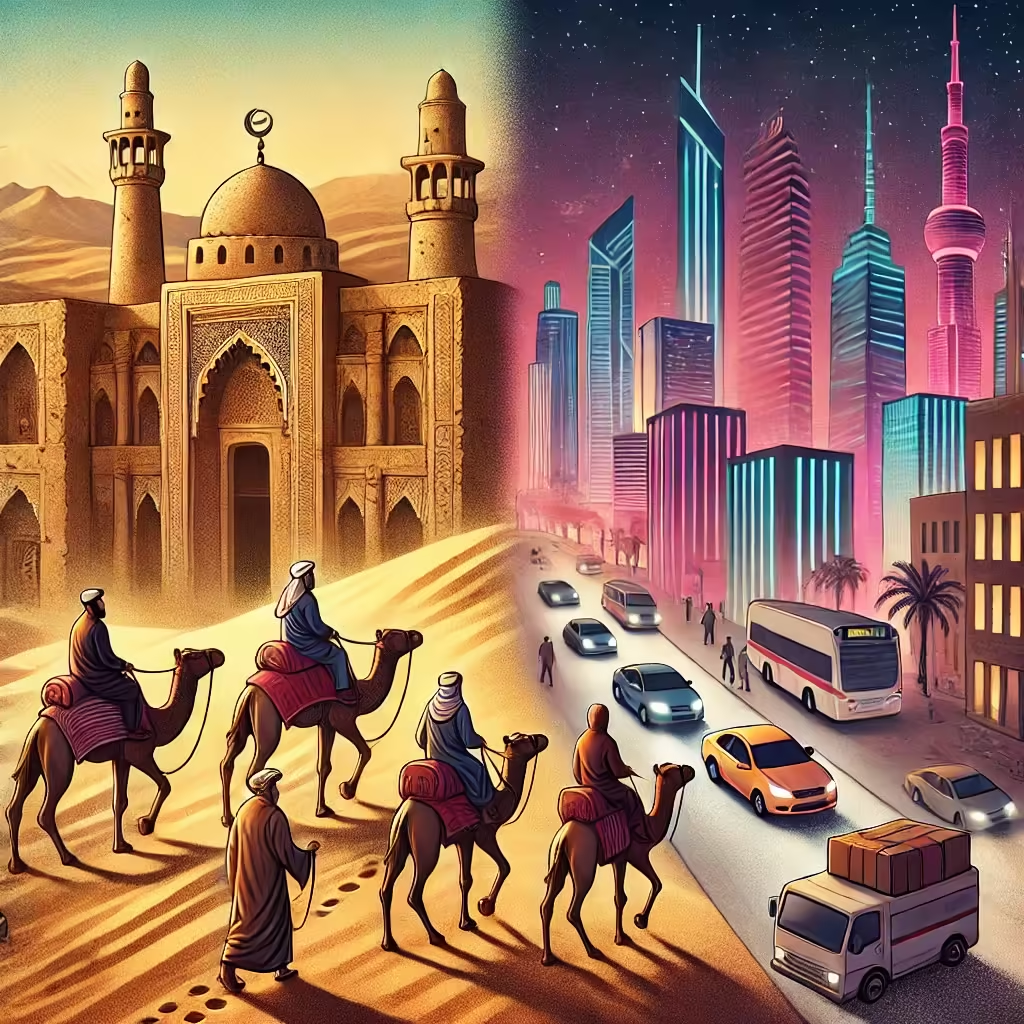Table of Contents
Introduction
This is the fifth part in a series of articles on “Lessons from Hijrah“. You can click here to read the full series, ALLAH willing.
In this article, we address the following questions:
- How does the Hijrah undertaken by the Prophet (Peace be upon Him) differ from the migrations we witness today?
- How did the Holy Qur’an convey the hardships and intensity of the Hijrah (migration)?
- Why do we no longer experience the same deep sense of meaning that the early emigrants felt?
- How has the word “Hijrah” evolved in our minds and hearts compared to how it resonated in the past?
The Real Meaning of Hijrah (Migration)
In this final article of our series, we reflect on the true essence of Hijrah (migration) in Islam. I stress this point because, in our modern times—marked by the general weakness across the Islamic world—many young people dream of migrating to Western countries. They long to leave their homelands, and as a result, we often lose sight of the deeper significance of Hijrah.

For the Arabs of that time, Hijrah (migration) meant severing ties with one’s home, family, and familiar surroundings—a deeply challenging and painful experience. While the gravity of such a separation may still resonate today, it was even more severe then, akin to the idea of losing one’s citizenship. A tribe provided a person with security, support, and strength. Therefore, unlike the way many might view migration now, the Arabs of that era did not look upon Hijrah (migration) with longing; they couldn’t grasp its meaning in the way we often do today.
Hijrah represented a profound detachment—not only from land but from one’s people, protection, and identity. For an Arab, to be ostracized or disowned by their tribe was one of the harshest forms of punishment, leaving them exposed and vulnerable. This is why ALLAH Almighty equated Hijrah with an act as severe as taking one’s own life, as reflected in His words:
“And if WE had decreed upon them, “Kill yourselves” or “Leave your homes,” they would not have done it, except for a few of them. But if they had done what they were instructed, it would have been better for them and a firmer position [for them in faith]“1
(Suraat ‘An-Nissaa’: 4:66)
This verse captures the true gravity of Hijrah (migration). It allows us to feel the immense emotional and spiritual weight that accompanied such an action in those times.
Hijrah (Migration) Linked with Faith and Struggle
Therefore, in the Quran, we often find of Hijrah (migration) closely linked with faith and striving in HIS cause. This is beautifully reflected in the verse:
“Indeed, those who have believed and those who have emigrated and fought in the cause of ALLAH- those expect the mercy of ALLAH. And ALLAH is Forgiving and Merciful“2
(Suraat ‘Al-Baqarah: 2:218)
Similar verses appear in Surah Al-Anfal and Surah At-Tawbah, where the themes of faith, migration, and striving for the sake of ALLAH are intertwined, highlighting the profound spiritual significance of Hijrah (migration).
In a hadith narrated by An-Nasa’i with a sound chain, the Prophet (Peace be upon Him) said:
“The Shaitan sits in the paths of the son of Adam. He sits waiting for him, in the path to Islam, and he says: Will you accept Islam, and leave your religion, and the religion of your forefathers? But he disobeys him and accepts Islam.
Then he sits waiting for him, on the path to emigration, and he says: Will you emigrate and leave behind your land and sky? The one who emigrates is like a horse tethered to a peg. But he disobeys him and emigrates.
Then he sits, waiting for him, on the path to Jihad, and he says: Will you fight in Jihad when it will cost you your life and your wealth? You will fight and be killed, and your wife will remarry, and your wealth will be divided. But he disobeys him and fights in Jihad“
The Prophet (Peace be upon Him) then said:
“Whoever does that, then he had a right from ALLAH, the Mighty and Sublime, that HE will admit him to paradise…“3
What we should reflect on here is how migration is described in the same breath as striving, Islam, and faith. Hijrah (migration) holds a lofty status in Islam, emphasizing the sacrifices and dedication of true believers. Islam is indeed precious, and those who endure and overcome these trials demonstrate their unwavering commitment to ALLAH’s path.
Types of Migration in Islam
There are two types of Hijrah (migration) in Islamic history:
- Hijrah (Migration) to Abyssinia (Ethiopia): This migration was an escape to preserve one’s faith. When Muslims could no longer freely practice their religion in a land that rejected and opposed it, they sought refuge in another land where they could worship ALLAH in peace.
- Hijrah (Migration) to Medinah: This migration was different in nature; it was not merely about seeking refuge but about establishing the foundations of the Islamic faith.
The first migration, to Abyssinia, represents seeking safety for faith, while the second, to Medinah, signifies the active establishment and strengthening of Islam.
Islam Above Nationalism
Here, we can observe the relationship between Islam and nationalism. Today, we live in a world dominated by nation-states and nationalistic slogans, where the concept of the homeland is elevated above all else. In modern times, what is often considered sacred includes the state, homeland, flag, constitution, laws, national security, borders, and the land itself.

However, in Islam, religion holds a higher place than the homeland. This is why Muslims, throughout history, migrated beyond their homelands—whether to protect and preserve their faith or to establish it in new lands.
The Warning Against Preferring Homeland Over Religion
ALLAH Almighty, in HIS Noble Book, warns those who do not migrate—those who prioritize their homeland over their religion. In HIS words:
“Indeed, those whom the angels take [in death] while wronging themselves – [the angels] will say, “In what [condition] were you?” They will say, “We were oppressed in the land.” They [the angels] will say, “Was not the earth of ALLAH spacious [enough] for you to emigrate therein?” For those, their refuge is Hell – and evil it is as a destination. Except for the oppressed among men, women, and children who cannot devise a plan nor are they directed to a way – For those it is expected that ALLAH will pardon them, and ALLAH is ever Pardoning and Forgiving“
(Suraat ‘An-Nissaa’: 4:97-99)
This verse serves as a stern warning to those who have the means to migrate but choose not to, valuing their homeland more than their faith.
The Return of the Early Migrants
If we reflect on the early Muslims—those who migrated to Abyssinia and those who migrated to Medinah—we see an important lesson. Those who left for Abyssinia did not return to Mecca; instead, they returned to Medinah. Upon their arrival in Medina, they did not perceive it as a second Hijrah (migration). Rather, they saw themselves returning home, as Medinah became the center of their faith and community.
This highlights the true essence and feeling of migration in Islam—a profound sense of prioritizing and elevating religion, choosing it above all else, and being willing to sacrifice everything that is precious and valuable for its sake. It is crucial to remember this deeper meaning when we reflect on the Hijrah (migration) of the Prophet (Peace be upon Him) and His companions, who left behind their homes and familiar lives solely for the sake of preserving and establishing their religion.
Conclusion
We ask ALLAH Almighty to grant us knowledge that benefits us, to allow us to benefit from what HE has taught us, and to increase us in wisdom and understanding.
Peace, mercy, and blessings of ALLAH be upon you.
Sources:
Mohamed Elhamy. دروس الهجرة | 5 والأخيرة. معنى الهجرة الذي لا نشعر به | محمد إلهامي. YouTube Video.

